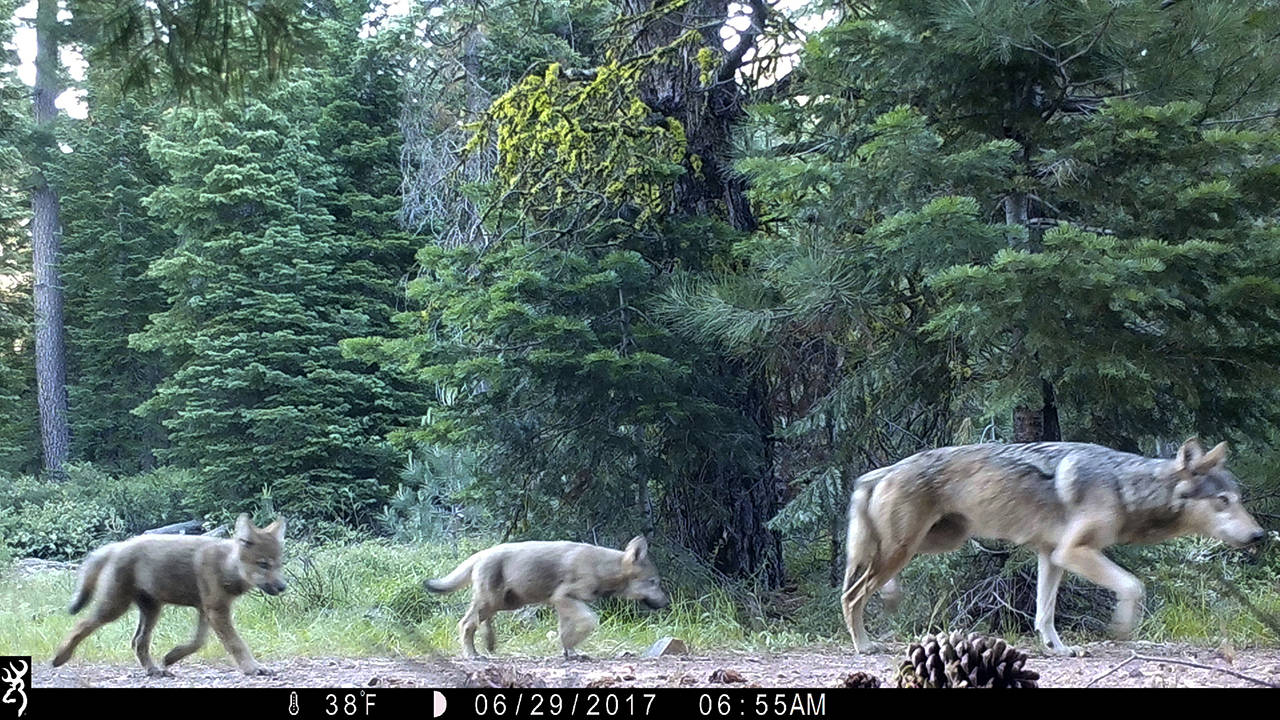By Nicholas K. Geranios / Associated Press
SPOKANE — Gov. Jay Inslee has directed the Washington Fish and Wildlife Commission to draft new rules governing the killing of wolves involved in conflicts with livestock, a move winning praise from conservation groups.
The Democrat on Friday reversed the commission’s denial of a petition filed by the Center for Biological Diversity in May that called for reform of the state’s wolf-management policies. He wrote in a letter to the commission that the potential for future conflicts between wolves and livestock, and the resulting killing of wolves, was unacceptably high.
“We must move more quickly and decisively to institute practices that will avoid the repeated loss of wolves and livestock in our state.,” Inslee said.
He directed the commission to create a standardized definition and requirements for the use of range riders. He also wants requirements for use of nonlethal deterrents, plans for areas of chronic livestock attacks to end the need for annual lethal removal of wolves.
“I strongly believe new rules and policies could, and should, be adopted and in place prior to the grazing season next year,” Inslee said.
Conservation groups praised the action. “The governor’s decision to approve this petition is a necessary step in cleaning up the mess the department has made of wolf management,” said Jocelyn Leroux, Washington and Montana director for Western Watersheds Project.
Sophia Ressler, an attorney with the Center for Biological Diversity, called it “a tremendous victory for Washington’s wolves and all of us who have been speaking out against the state’s relentless wolf-killing.”
Donny Martorello, a wolf specialist with Fish and Wildlife, said the wolf management process produces plenty of conflict.
“It’s a very contentious issue with little middle ground,” Martorello said. “You see that across the nation where there are wolves.”
The agency years ago created a special Wolf Advisory Group made up of stakeholders from all sides of the wolf issue, but there are still some groups that don’t want to compromise, he said.
The number of wolf packs in the state continues to rise, and the vast majority do not kill livestock, Martorello said. A rancher who is a member of the Wolf Advisory Group said changes were needed.
The current plan does not account for the declining population of deer and other ungulates that provide food for wolves in the wild, which has knocked the predator-prey relationship out of balance, said Samee Charriere, who ranches near Clarkston.
“The plan has no way to account for locally dense wolf populations,” Charriere said. “Therefore there are areas of the state that have reached recovery and need additional management tools.”
The state has killed 34 wolves since 2012, most of them for livestock conflicts in the Kettle River Range, an area of prime wolf habitat. Twenty-nine of the wolves killed have been for the benefit of the same rancher.
Wolves were exterminated in Washington by the 1930s, but they began returning to the state from Idaho and British Columbia early this century. Most live in sparsely-populated northeastern Washington state.
The DFW estimates the state’s wolf population grew to 145 animals in 26 packs in 2019. But the rate of growth in the number of wolves has slowed substantially in recent years, the Center for Biological Diversity said.
The U.S. Fish and Wildlife Service has ended Endangered Species Act protection for wolves in the eastern third of the state. Under state law, wolves are listed as endangered throughout Washington.
That didn’t prevent the state from wiping out all three members of the so-called Wedge Pack in August for the second time since 2012. The DFW has also ordered that some members of the Togo and Leadpoint packs be killed, hoping that will change the behavior of the survivors.
Environmentalists say the problem is that wolves are being killed in prime habitat regions, which are almost immediately re-colonized by other wolves that begin preying on the same livestock.
It’s an endless cycle, said Sophia Ressler, an attorney for the Center for Biological Diversity. “Killing wolves does not solve any problems.”
Instead, the state should focus on hiring more range riders, using lights, removing dead or injured livestock, and other non-lethal methods to keep wolves away from cattle, she said.
“We need to work toward co-existence with these creatures,” Ressler said. “These wolves shouldn’t be gunned down just for trying to feed their families.”
Environmentalists contend range riders are needed for longer periods of time in country shared by wolves and cattle. The DFW also relies on livestock producers to remove sick or injured livestock from fields, a process that can take weeks.
That “amounts to baiting wolves,” Leroux said.
The DFW also recently removed a vocal wolf advocate from the Wolf Advisory Group for disagreeing with the department’s choices, conservation groups said.
Tim Coleman of Republic had served on the advisory group since 2015 and is the executive director of Kettle Range Conservation Group. The Department of Fish and Wildlife cited his participation in lawsuits, protests, interviews and other activities critical of the agency for his removal.
Coleman said he was “devastated” by his dismissal, which he blamed in part on the livestock industry. “I was often the only voice speaking for those who believe wolves have a right to live in our state’s forests,” he said.
Talk to us
> Give us your news tips.
> Send us a letter to the editor.
> More Herald contact information.

























